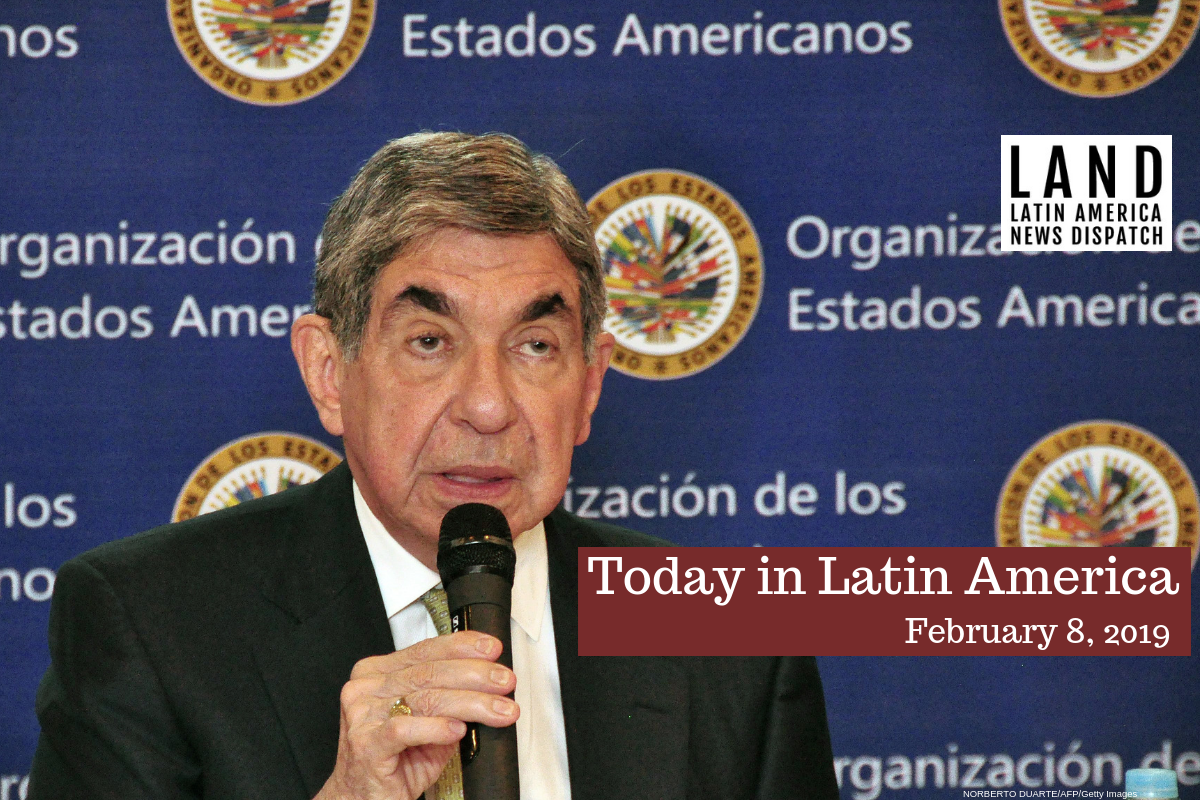

COSTA RICA: Two more women have accused Nobel laureate and former Costa Rican President Óscar Arias Sánchez of sexual misconduct. Yesterday, Eleonora Antillón, a San Jose-based journalist, told the Associated Press that Arias assaulted her in the mid-1980s. In another interview, Emma Daly, head of communications for Human Rights Watch, said Arias groped her in Nicaragua in 1990.
In the span of two days, four women have accused the two-term president and 1987 Nobel Peace Prize winner of sexual misconduct. Arias has categorically denied all the allegations. On Monday, Alexandra Arce von Herold, a psychiatrist, and anti-nuclear activist, filed a criminal complaint against Arias, accusing him of sexually assaulting her in 2014. Three other accusers followed within a 48-hour span.
HEADLINES FROM THE WESTERN HEMISPHERE
NORTH AMERICA
BORDER: The United Nations human rights office released a statement yesterday identifying ICE’s decision last month to force-feed detainees at the El Paso Processing Center as a possible violation of international conventions against torture. According to the Office of the High Commissioner for Human Rights, the actions could be tantamount to “ill-treatment” that violates the U.N. Convention Against Torture, which was ratified by the United States in 1994. On the same day, Democratic lawmakers sent a letter to ICE requesting more information on the decision to force-feed the detainees.
MEXICO: Mexican authorities say they discovered 19 bodies in hidden graves in the western Mexican state of Colima. The governor of Colima, José Ignacio Peralta Sánchez, said in a press conference that there may be more bodies that have not been found by law enforcement. The governor went on to say that it is too early to say which criminal group was responsible. Mexican authorities plan to analyze the DNA of the bodies and compare it with a database of missing persons.
UNITED STATES: A veterinarian was sentenced to six years in prison yesterday for using puppies to smuggle heroin for Colombian drug traffickers. According to authorities, Andrés López Elorez rented a farm in Colombia where he surgically implanted packets of liquid heroin into the nine puppies. After a raid of the farm in 2005, Elorez fled to Spain where he was arrested in 2015 and extradited to the United States in 2018. Elorez pleaded guilty to conspiring to import heroin into the United States in September. One of the puppies, Heroina, was adopted and trained by Colombian officers to detect drugs.
THE CARIBBEAN
HAITI: Anti-government protesters took to the streets of Port-au-Prince yesterday, demanding the resignation of President Jovenel Moïse. Most reports came from social media users, who said the demonstrators are protesting the corrupt regime that took office in November 2017.
The protest is growing with people showing severe anger toward the President and his government. They are very frustrated about the “economic emergency” and @moisejovenel’s lack of results two years after his inauguration. #Haiti pic.twitter.com/guMvCb6VGs
— Etant Dupain (@gaetantguevara) February 7, 2019
Haiti has experienced mass-scale protests since a scandal involving the misuse of $2 billion associated with an oil program with Venezuela. Yesterday, six arrests were reported by the Haitian National Police.
CENTRAL AMERICA
GUATEMALA: The Guatemalan Congress will soon vote on a blanket amnesty for those convicted of extrajudicial killings and torture during the 36-year armed conflict. Passed during the Peace Accords of 1996, the National Reconciliation Law has yielded 33 convictions among military officers and guerrilla combatants. Under the proposed amendment, all those convicted would go free. The High Commissioner for Human Rights, Michelle Bachelet, has criticized this legal change, saying that victims “will lose trust in the state.” Several civil society groups from the hemisphere, like the relatives of the disappeared during the Argentinean military dictatorship, have rejected this legislative initiative.
THE ANDES
VENEZUELA: Following President Nicolás Maduro’s decision to block the opposition led by National Assembly leader Juan Guaidó from bringing international humanitarian aid into Venezuela, Elliot Abrams, the U.S. special envoy for Venezuela, said that he wanted Maduro to leave Venezuela and cede power. Later on, the Secretary-General of the United Nations António Guterres said, “humanitarian aid should never be used as a political pawn.”Also yesterday, Uruguay hosted the first session of the International Contact Group for Venezuela where an EU official called for free and fair elections in Venezuela.
SOUTHERN CONE
ARGENTINA: On Tuesday, the Argentine Diocese of Oran announced that Archbishop Carlos Alberto Sánchez will proceed with the next stage of the investigation into Bishop Gustavo Zanchetta, a sign that the accusations are credible enough to warrant further investigation. Reverend Juan José Manzano, Zanchetta’s former deputy, reported Zanchetta to the Vatican for incidents of inappropriate behavior in 2015 and 2017. However, the Vatican began investigating Zanchetta in 2018, citing accusations of misconduct.
CHILE: Yesterday, Pinochet-era army chief Juan Emilio Cheyre was arrested after a Chilean Court of Appeals opened a new investigation into Cheyre for the alleged torture of 24 prisoners following the military coup of 1973 that gave rise to Augusto Pinochet’s dictatorship. Cheyre and the other military officials were accused of using beatings, electric shocks, mock executions, water torture, hangings and sexual assaults against prisoners. Cheyre remained in custody for a judicial hearing.


